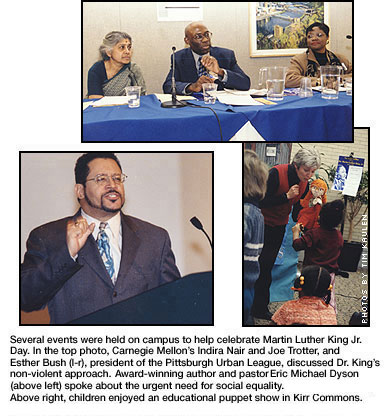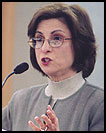|
|
||||||
|
|
|
 President Cohon Features "Faces of Diversity" in Annual MLK Day Address � Friend of the Court Brief is Filed in Support of University of Michigan, Affirmative Action President Jared L. Cohon opened his grade book and gave the Carnegie Mellon community a "B" for its efforts thus far to increase diversity. "We've made good progress in student recruitment, admissions and retention, some progress with regard to women in the technical areas, both faculty and students, and in some leadership positions," said Cohon after delivering his annual state of diversity address to begin campus events celebrating Martin Luther King Jr. Day on Jan. 20. "I think our biggest weakness is in minorities in management and leadership positions and faculty. "I also think that we are making progress in the all-important culture and climate. It's very hard to measure. It's really just a sense that one has. But I think there are signs of progress." Cohon emphasized that increasing diversity must be a focus of the entire university community. "Diversity is an issue, a challenge, a goal for this university that belongs to all of us," he said. "It's not just the president's priority. It must be a priority for all of us, otherwise we will not be successful."
Daniels was cited for creating the highly successful Martin Luther King Jr. Day Writing Awards program, in which local high school and Carnegie Mellon students submit poetry and narratives dealing with personal experiences regarding racial difference and discrimination. Students read their work as part of the university's Martin Luther King Jr. Day celebration. About 100 entries were received this year. Blum was lauded for her efforts in helping to establish women@scs, a mentoring and support group for women in computer science. "The program has led to a dramatic increase in the percentage of women in our undergraduate computer science program and in their retention, and in the overall quality of the program," Cohon said. Akin is director of a select six-week internship program that brings juniors and seniors from Historically Black Colleges and Universities (HBCU) to Carnegie Mellon each summer. The purpose of the program, now in its fifth year, is to make these students aware of the architectural research programs at Carnegie Mellon, to encourage them to pursue a graduate degree here, and to consider teaching as a professional career. The interns take three mini-courses in urban architecture, building economics and computer-aided design. "Most students go into professional practice when they get their undergraduate architecture degree and as a result we don't get many people going into academia," Akin said. Kass, head of the Statistics Department, and Greenhouse run a similar summer program aimed at attracting HBCU undergraduates to pursue graduate work at Carnegie Mellon. Half works with students to help coordinate several multicultural events throughout the year that celebrate diversity, such as Black History Month, Hispanic Heritage Month, the "Speak Your Mind" series and diversity town hall meetings. "Emily has done a fantastic job and has her hands in virtually everything relating to diversity," Cohon said. Tucker and Heidish were featured by President Cohon for their work as co-chairs of the International Student Task Force, a committee established by Provost Mark Kamlet in January 2002 to study academic issues, university services and student life from an international student's perspective. The international student population has grown rapidly over the last five years, and today about 20 percent of the university's undergraduate population consists of international students (13.2% have their permanent residence abroad, while 6.5% are permanent residents of the U.S.). "Little attention has been given to the needs of these international students," Cohon said. "They have unique needs." The International Student Task Force has submitted several recommendations to improve the quality of life for international students on campus. Recommendations include: all faculty should state their academic expectations for each class "as clearly and unambiguously as possible in writing"; the Eberly Center for Teaching Excellence should develop a series of "best practices" for teaching international students; Dining Services should provide a diverse range of meal options that address the dietary requirements of international students; and the Diversity Advisory Council should review its statements about diversity to include international students. The full report is online through the Diversity Resource Guide at www.cmu.edu. President Cohon also paid tribute to students Catherine Oh, Karina Garcia, Eray Chou, Elisa Echeverria and Rodney Sanders for their work to advance diversity efforts on campus. Oh is the former president of the Taiwanese and Korean student associations; Garcia, president of SALSA, the Latin American Student Association, is a multicultural intern involved in coordinating many diverse events on campus; Chou is president of the Lunar Gala Fashion Show, which features contemporary Asian clothing; Echeverria is part of the Heinz School Diversity Committee and Black Graduate Student Organization; and Sanders is an executive board member of the Black Graduate Student Organization, a member of the Black Business Student Association, and is involved in the planning for Black History Month.
"How Are We Doing?" "A lot of good news," according to President Cohon, can be found in undergraduate enrollment, where minorities represent about 10% of the total student body—up from 9% a year ago. This represents a 3% increase in the number of minority students in this year's freshman class (from 9% last year to 12% this year). The yield for minority students—the percentage of students who actually attend after being admitted—rose from 20% to 23%, which is nearly the same as the 25% yield rate for the entire freshman class. The attrition rate also bears good news. Since 1992, the overall freshman attrition rate—those students leaving the university after their freshman year—dropped from 12.5% to 5% in 2001. Minority freshman attrition has dropped from 26% in 1992 to 2% in 2001. Only one minority student left Carnegie Mellon after his freshman year in 2001. Cohon called this decrease "phenomenal." In response to a question from the audience regarding the percentage of tenured minority faculty at Carnegie Mellon, Cohon said the university is not that far from its peer institutions. "We're lower than our peers, but not as low as we used to be. We're in the range. We're at about 2% and its been flat for the last few years," Cohon said.
"Why Affirmative Action?" "If you believe in diversity, how do you achieve it? It can be done in ways that are practiced at Michigan and Carnegie Mellon," Cohon said. "Affirmative action doesn't mean that we have quotas, or set-asides. Michigan does not use quotas. Second, and more important, it doesn't mean that we are admitting students who are unqualified to be here, or who are incapable of doing the work, just because they are members of an underrepresented minority. "Everyone who is admitted to Carnegie Mellon deserves to be here, both for academic reasons and for what he or she contributes outside the classroom, and everyone is highly capable of excelling academically. "Carnegie Mellon is in the privileged position of having more excellent students apply here each year than we can possibly admit. What this means, then, is that we have the luxury of admitting students who are both academically qualified and who contribute something else to the university community.
"Affirmative action is essential to making Carnegie Mellon a diverse university, which is crucial for making it the best university that it can be. And that, in my opinion, is something very much worth fighting for—all the way to the Supreme Court, if necessary."
�
�
Top�
�
�
Bruce Gerson
|
||||
|
This Issue's Headlines || Carnegie Mellon News Home || Carnegie Mellon Home |
||||||
 Maureen Cohon, chair of the Non-Traditional Couples and Families Group at Buchanan Ingersoll, Attorneys, recently delivered a lecture on campus on "The Vulnerabilities of Non-Traditional Families." Cohon addressed the legal issues and complications associated with living together, adoption and children, separation or termination of the relationship, estate planning and property issues. Maureen Cohon is the wife of Carnegie Mellon President Jared L. Cohon. The lecture was sponsored by the Academy for Lifelong Learning.
�
�
Maureen Cohon, chair of the Non-Traditional Couples and Families Group at Buchanan Ingersoll, Attorneys, recently delivered a lecture on campus on "The Vulnerabilities of Non-Traditional Families." Cohon addressed the legal issues and complications associated with living together, adoption and children, separation or termination of the relationship, estate planning and property issues. Maureen Cohon is the wife of Carnegie Mellon President Jared L. Cohon. The lecture was sponsored by the Academy for Lifelong Learning.
�
�